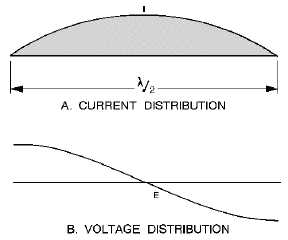4-21
Methods of Feeding Energy to an Antenna
Voltage and current distribution for the half-wave antenna (shown in figure 4-16) is the same as that
for the antenna discussed earlier in this chapter. A point closely related to the voltage and current
distribution on an antenna is the method of feeding the transmitter output to the antenna. The simplest
method of feeding energy to the half-wave antenna is to connect one end through a capacitor to the final
output stage of the transmitter. This method is often called the END-FEED or VOLTAGE-FEED method.
In this method the antenna is fed at a point of high voltage (the end).
Figure 4-16.—Standing waves of current and voltage.
Energy may also be fed to the half-wave antenna by dividing the antenna at its center and connecting
the transmission line from the final transmitter output stage to the two center ends of the halved antenna.
Since the antenna is now being fed at the center (a point of low voltage and high current), this type of feed
is known as the CENTER-FEED or CURRENT-FEED method. The point of feed is important in
determining the type of transmission line to be used.
QUARTER-WAVE ANTENNAS
As you have studied in the previous sections, a 1/2 wavelength antenna is the shortest antenna that
can be used in free space. If we cut a half-wave antenna in half and then ground one end, we will have a
grounded quarter-wave antenna. This antenna will resonate at the same frequency as the ungrounded half-
wave antenna. Such an antenna is referred to as a QUARTER-WAVE or Marconi antenna. Quarter-wave
antennas are widely used in the military. Most mobile transmitting and receiving antennas (fig. 4-17) are
quarter-wave antennas.


